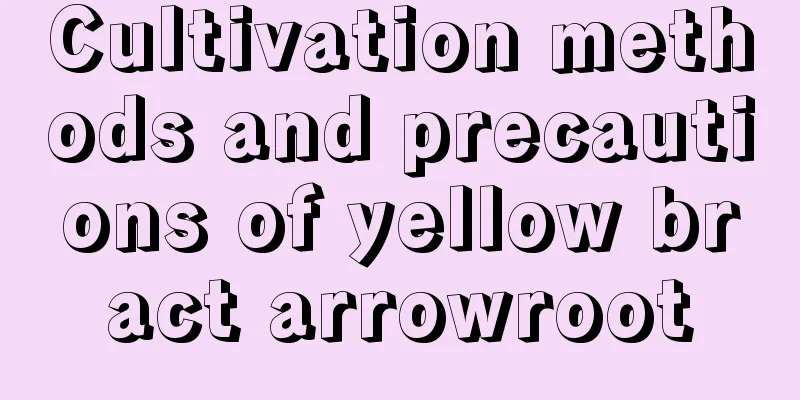Cultivation methods and precautions of yellow bract arrowroot

1. Maintenance methods1. Temperature: Caladium grows well under high temperatures, which can be seen from its origin. Generally speaking, it will grow better if the temperature is kept between 25 and 30 degrees. In addition, its cold resistance is very poor, so it is safer to keep the temperature above 15 degrees. If the temperature is below thirteen degrees, it may freeze. 2. Light: The yellow-bracted arrowroot prefers a semi-shaded environment and is afraid of direct sunlight. Strong light can cause its leaves to curl and dry up, so it needs to be properly shaded when the light is strong. But be careful not to keep it in complete darkness, because it still needs a certain amount of sunlight to grow. 3. Watering: Caladium likes moisture but is afraid of waterlogging. Therefore, sufficient water needs to be provided during the growth period, but water should not accumulate. Then there is the air humidity. In summer, try to spray more water to make the leaves look more moisturized. 4. Fertilization: Phosphorus fertilizer and potassium fertilizer are relatively the most important. It can be applied once every half a month, liquid fertilizer can be used, and the concentration needs to be strictly controlled. 2. Breeding techniques1. Reproduction: It can be carried out by division. Generally speaking, it is done when the weather is warm, such as around May, otherwise the wounds will be difficult to recover after division. When dividing the plant, it is important to note that each part cannot be too small, and must have sufficient strong roots and an appropriate amount of leaves. The planting depth must also be strictly controlled and not too deep, otherwise it will affect the growth. 2. Repotting: Try to do it every one or two years. When propagating by division, it can be done together and replaced in spring. Specifically, the soil used can be a mixture of peat soil, leaf mold, and an appropriate amount of coarse sand. Note: alkaline soil cannot be used. 3. Problem diagnosis and treatment1. Disease: Too much watering will cause "root rot", and the roots need to be removed from the pot and trimmed. Then there is "white rot", which is also caused by excessive watering and is prone to occur in July and August. Available sterilizing agents. 2. Pests: Mainly "scale insects" and "red spiders", which reproduce very quickly. In addition to normal spraying, you can also spray water to inhibit their reproduction. IV. Other issues1. Toxicity: It is non-toxic. 2. Can it be grown at home: Yes, it is a good ornamental plant. |
<<: Cultivation methods and precautions of Dendrobium officinale
>>: Huang Qiuying's breeding methods and precautions
Recommend
How to Eat Saffron
1. Soak in water directly Take 5-8 saffron roots ...
Key points of planting time and method of plum beans
Planting time of plum beans The planting of beans...
What is the best month to plant garlic?
When to plant garlic Garlic is mostly sown and pr...
Does Amaryllis prefer shade or sun?
Does Amaryllis prefer shade or sun? Amaryllis is ...
Application of aspirin in potted plants
Aspirin can improve the survival rate of seedling...
How to grow Clivia more vigorously in summer?
Clivia is known for its elegant posture and digni...
The difference between stone reed and wawe
1. Difference of blades The leaves of stone reed ...
How to prune white orchid after flowering
Pruning white orchid after flowering The best tim...
This flower can survive on a wooden board without soil, and it will bloom with just a little water!
Dendrobium Dendrobium is also called the resurrec...
Classification of common osmanthus varieties
1. Osmanthus fragrans variety group It grows in a...
What are the cultivation methods and precautions of Guanyin bamboo?
How to grow Guanyin bamboo Guanyin bamboo likes a...
How to deal with African jasmine root rot
Symptoms of root rot If the roots are rotten, the...
What fertilizer to use for growing lucky bamboo in water
1. High fertilizer requirement Lucky bamboo likes...
What are the cultivation methods and precautions for succulent flowers?
How to propagate succulent flowers Succulent flow...
Is it better to use a large or small pot for lilies?
Is it better to use a large or small pot for lili...









